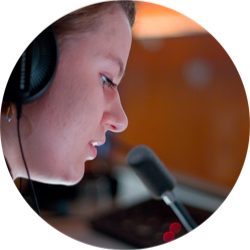
Your checklist for the use of interpreters at European works council meetings
- How many and which different languages should be actively spoken at your European works council meeting?
- In how many and which different languages should the audience be able to listen to the meeting?
- Does the meeting only take place in one place or does the group move around?
- Are break-outs/parallel groups planned?
- For how many people in total should interpreting be provided?
- Should all languages be interpreted the entire time?
- What technical equipment is already available at the venue?
- What technical equipment is included in your conference package?
- Do you also require interpreting at a fringe event?
- Is there a specific dress code for the interpreters?
- Should the interpreters eat with the group or separately?
- Do you also require interpreting for lunch?
- Who is the contact person for the interpreters on site?
- When should the interpreters arrive? The clock starts ticking at this time, even if the meeting starts later.
Meetings of European Works Councils follow their own rules - exotic language combinations, often many interpreters for just a few participants, changing venues, different constellations, fluctuating interests – yet you can trust in our consistently reliable interpreting services, whether as a long-standing partner accompanying you from venue to venue or as local partner at your one-time meeting place for one-off support.

